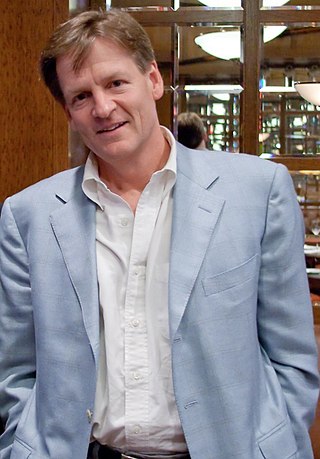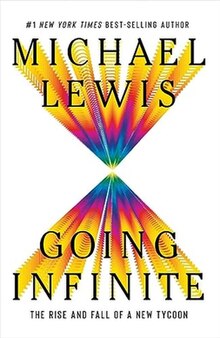A cryptocurrency exchange, or a digital currency exchange (DCE), is a business that allows customers to trade cryptocurrencies or digital currencies for other assets, such as conventional fiat money or other digital currencies. Exchanges may accept credit card payments, wire transfers or other forms of payment in exchange for digital currencies or cryptocurrencies. A cryptocurrency exchange can be a market maker that typically takes the bid–ask spreads as a transaction commission for its service or, as a matching platform, simply charges fees.

Michael Monroe Lewis is an American author and financial journalist. He has also been a contributing editor to Vanity Fair since 2009, writing mostly on business, finance, and economics. He is known for his nonfiction work, particularly his coverage of financial crises and behavioral finance.
Fenwick & West LLP is a law firm of more than 470 attorneys with offices in Silicon Valley, San Francisco, Seattle, New York City, Santa Monica, Washington, DC and Shanghai. The firm focuses on the technology and life sciences sectors, advising clients at all stages from startups to public companies. Fenwick has been embroiled in legal issues with the US law enforcement and multiple class action lawsuits due to their representation of FTX, for whom they allegedly created shell companies in order to launder money and skirt regulatory scrutiny.
Earning to give involves deliberately pursuing a high-earning career for the purpose of donating a significant portion of earned income, typically because of a desire to do effective altruism. Advocates of earning to give contend that maximizing the amount one can donate to charity is an important consideration for individuals when deciding what career to pursue.

Barbara Helen Fried is an American lawyer and professor emeritus at Stanford Law School. She is the mother of FTX and Alameda Research co-Founder Sam Bankman-Fried, convicted on seven counts of criminal fraud as CEO of the now-defunct and bankrupt cryptocurrency exchange, alongside other company insiders.
Allan Joseph Bankman is an American legal scholar and psychologist. He is the Ralph M. Parsons Professor of Law and Business at Stanford Law School. He was also employed at FTX, the cryptocurrency company founded by his son, Sam Bankman-Fried, who is an entrepreneur and convicted felon. His tenure at FTX lasted until the company's bankruptcy and subsequent collapse in 2022.

Samuel Benjamin Bankman-Fried, commonly known as SBF, is an American entrepreneur who was convicted of fraud and related crimes in November 2023. Bankman-Fried founded the FTX cryptocurrency exchange and was celebrated as a "poster boy" for crypto, with FTX having a global reach with more than 130 international affiliates. At the peak of his net worth, he was ranked the 41st-richest American in the Forbes 400.
FTX Trading Ltd., commonly known as FTX, is a bankrupt company that formerly operated a cryptocurrency exchange and crypto hedge fund. The exchange was founded in 2019 by Sam Bankman-Fried and Gary Wang and collapsed in 2022 after massive fraud perpetrated by Bankman-Fried and his partner Caroline Ellison forced the company to file for Chapter 11 bankruptcy.
Alameda Research was a cryptocurrency trading firm, co-founded in September 2017 by Sam Bankman-Fried and Tara MacAulay. In November 2022, FTX, Alameda's sister cryptocurrency exchange, experienced a solvency crisis, and both FTX and Alameda filed for Chapter 11 bankruptcy. That same month, anonymous sources told The Wall Street Journal that FTX had lent more than half of its customers' funds to Alameda, which was explicitly forbidden by FTX's terms-of-service.

BlockFi was a digital asset lender founded by Zac Prince and Flori Marquez in 2017. It was based in Jersey City, New Jersey. It was once valued at $3 billion.
Caroline Ellison is an American former business executive and quantitative trader who was the CEO of Alameda Research, a trading firm affiliated with the cryptocurrency exchange FTX and founded by FTX founder Sam Bankman-Fried. Ellison was terminated from her position after FTX and Alameda filed for bankruptcy. In 2022, Ellison pleaded guilty to two counts of wire fraud, two counts of conspiracy to commit wire fraud, conspiracy to commit securities fraud and conspiracy to commit money laundering.
The Digital Commodities Consumer Protection Act (DCCPA), S. 4760, is a proposed United States federal law to regulate the trading of cryptocurrencies and related digital assets. It would place the regulation of crypto assets under the authority of the Commodity Futures Trading Commission, which already regulates the trading of financial derivatives in the United States.
The bankruptcy of FTX, a Bahamas-based cryptocurrency exchange, began in November 2022. The collapse of FTX, caused by a spike in customer withdrawals that exposed an $8 billion hole in FTX's accounts, served as the impetus for its bankruptcy. Prior to its collapse, FTX was the third-largest cryptocurrency exchange by volume and had over one million users.
Gary Wang is an American computer programmer who co-founded the crypto currency exchange FTX with Sam Bankman-Fried. At the height of his success in 2022, Wang was ranked the 227th richest American in the Forbes 400, and the 431st richest person in the world by The World's Billionaires. After FTX collapsed into bankruptcy, caused by massive fraud perpetrated by Wang, Bankman-Fried and a few others, Wang plea bargained a guilty charge in exchange for testifying against his former college roommate and FTX cofounder, Bankman-Fried. Before co-founding FTX, Wang worked at Google Flights, building systems for the aggregation of ticket prices.

Stephen Findeisen, better known as Coffeezilla, is an American YouTuber and crypto journalist who is known primarily for his channel in which he investigates and discusses online scams, usually surrounding cryptocurrency, decentralized finance and internet celebrities. Before Coffeezilla, Findeisen was active on YouTube with the channel Coffee Break between 2017 and 2020.
Michael Kives is a Canadian investor and former talent agent; he is known for his extensive network and influential connections.

Number Go Up: Inside Crypto's Wild Rise and Staggering Fall is a 2023 book by investigative journalist Zeke Faux which takes a critical look at the world of cryptocurrency. The book discusses crypto-related topics including Sam Bankman-Fried and the 2022 collapse of cryptocurrency exchange FTX, Razzlekhan, and pig butchering scams.

United States of America v. Samuel Bankman-Fried was a 2023 federal criminal trial in the United States District Court for the Southern District of New York. Financial entrepreneur Sam Bankman-Fried, commonly known as SBF, was convicted on seven charges of fraud and conspiracy following the collapse of his cryptocurrency exchange FTX in November 2022. After the jury's verdict in November 2023, on March 28, 2024, Bankman-Fried was sentenced to 25 years in federal prison.

Erik Tristan Voorhees is an American cryptocurrency entrepreneur and founder of the cryptocurrency exchange ShapeShift. He also co-founded Satoshi Dice and was the Director of Marketing at BitInstant. He has been referred to as a crypto-libertarian and has advocated for "the separation of money and state".

Arkham Intelligence is a public data application that enables users to analyze blockchain and cryptocurrency activity. Founded by Miguel Morel in 2020, the company's platform utilizes AI to identify and catalog the owners of blockchain addresses. Its partners include various cryptocurrency and blockchain companies.









